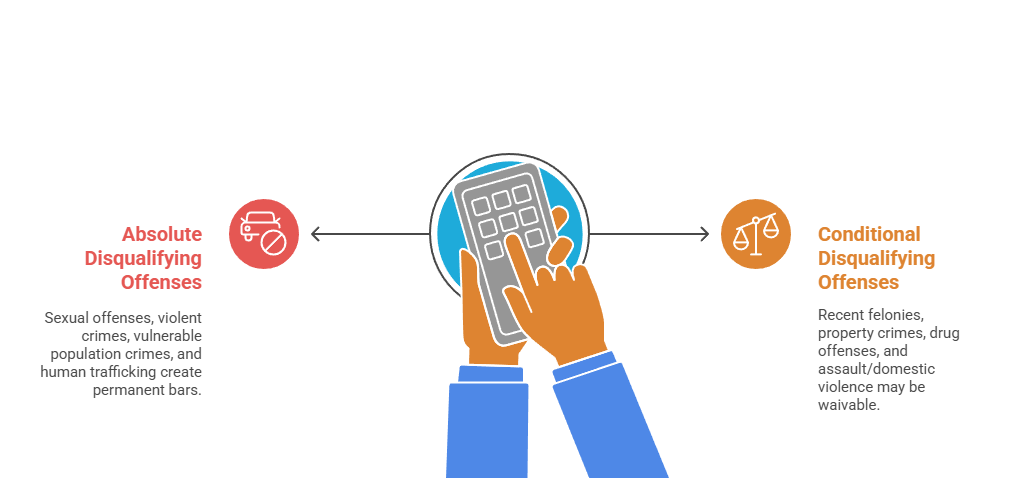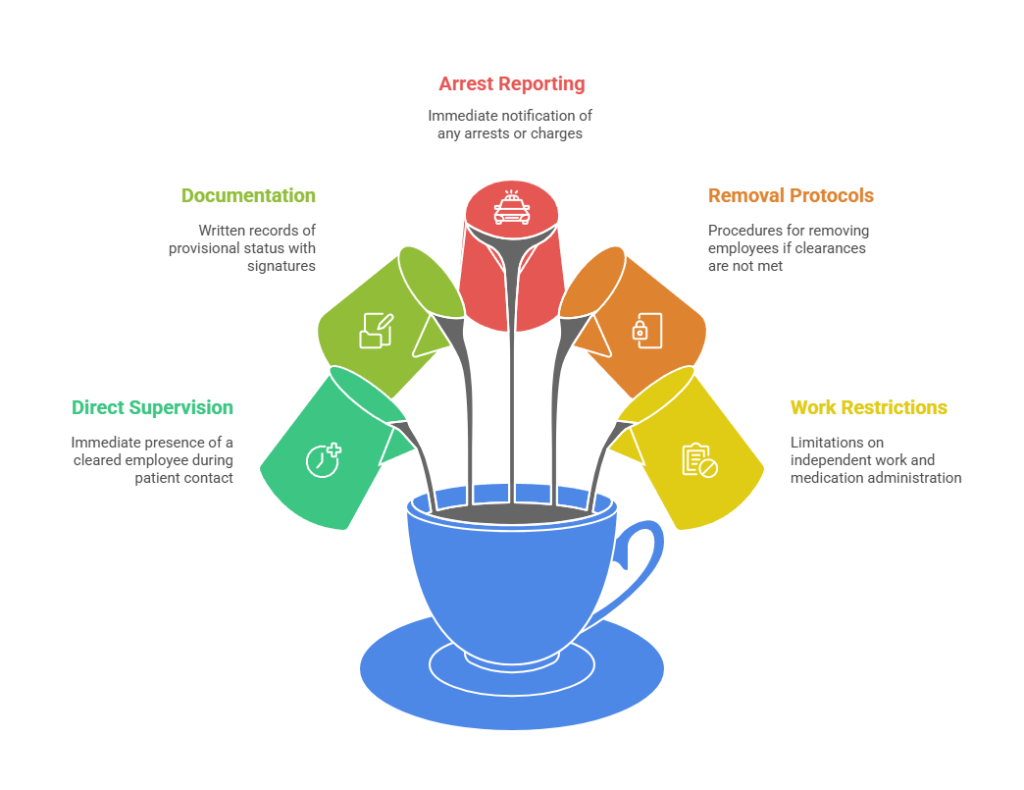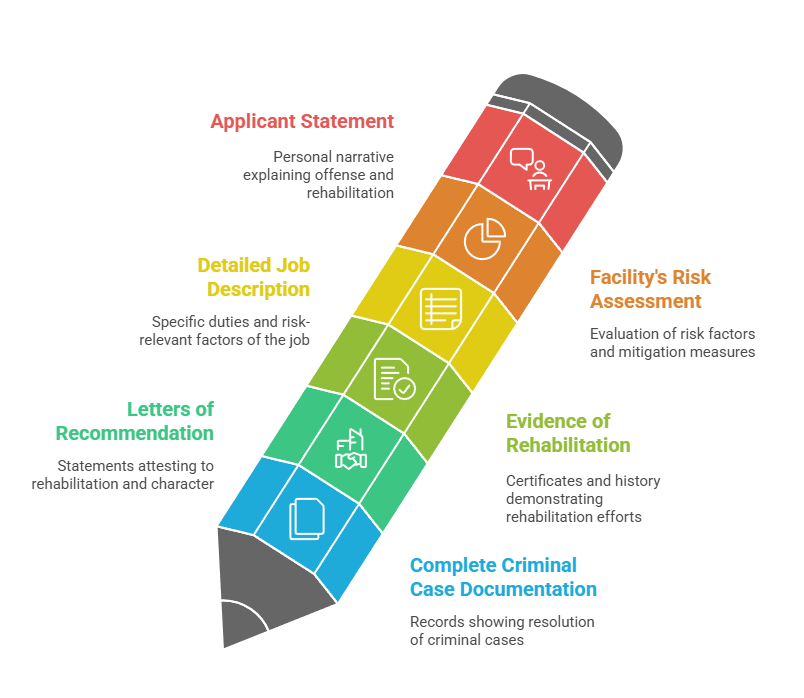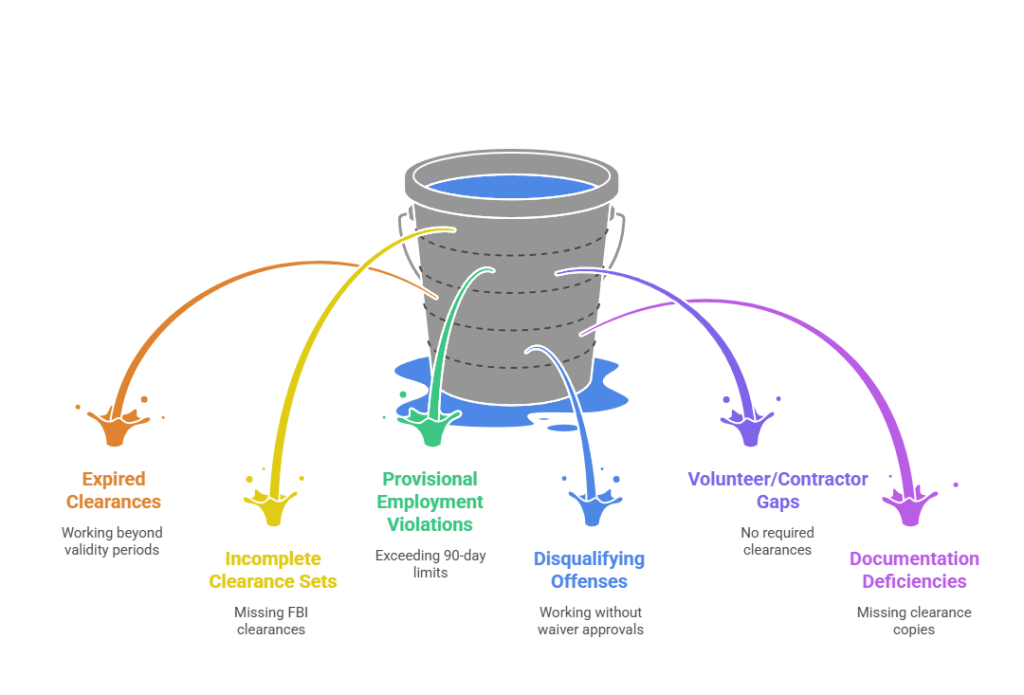Pennsylvania nursing home background check requirements mandate a three-tiered screening process including Pennsylvania State Police Criminal History, DHS Child Abuse History Clearance, and FBI fingerprint-based background checks for all employees with direct patient contact. Facilities must implement continuous compliance monitoring under Act 73 provisions while adhering to specific DHS clearance timelines that protect vulnerable populations and avoid costly regulatory penalties reaching $2,500 per violation.
Key Takeaways
- Pennsylvania nursing facilities must obtain three mandatory clearances for all employees: Pennsylvania State Police Criminal Record Check, DHS Child Abuse History Clearance, and FBI fingerprint-based background check before direct patient contact begins.
- Act 73 of 2007 establishes strict criminal history review standards specifically for long-term care facilities, with specific disqualifying offenses that create permanent employment bars for certain convictions.
- DHS clearance requirements mandate renewals every 60 months for state clearances and every 5 years for FBI fingerprinting, creating ongoing compliance obligations for HR departments.
- Provisional employment is permitted for up to 90 days while FBI clearances are pending, but only under direct supervision and after state-level clearances are completed.
- Disqualifying offenses include any felony within the past 10 years, crimes involving abuse or neglect, violent crimes, theft, drug trafficking, and all sexual offenses regardless of timeframe.
- Non-compliance penalties can reach $2,500 per violation per day, with potential facility license suspension and exclusion from Medicare/Medicaid reimbursement programs.
- Pennsylvania long-term care facility background checks must be completed for employees, contractors, volunteers, students, and any individual with routine access to patients or their living areas.
- Healthcare background screening timelines require strategic workforce planning, with state clearances processing within 7-10 business days and FBI results taking 4-8 weeks during peak periods.
Understanding Pennsylvania's Three-Tiered Background Check System
Pennsylvania maintains one of the most complete healthcare worker screening frameworks in the United States. The system protects vulnerable populations in nursing homes and long-term care settings. Pennsylvania nursing home background check requirements establish a three-clearance system that creates multiple verification layers, ensuring facilities identify potential risks before granting patient access.
State Police Criminal Record Requirements
The Pennsylvania State Police Criminal History Check represents the foundation of the state's screening process. This database search reviews convictions and pending charges within Pennsylvania's jurisdiction, covering all 67 counties. The application process occurs through the Pennsylvania Access to Criminal History (PATCH) system, with results typically delivered within 7-10 business days.
HR directors should note that Pennsylvania clearances only capture Pennsylvania-specific criminal activity. This creates potential gaps for employees who lived or worked in other states. Facilities can request these checks directly through the State Police website, and applicants must provide complete residential history for the past ten years.
For compliance officers managing high-volume hiring, establishing a PATCH account with batch processing capabilities significantly reduces administrative burden. Most clearances process within one to two weeks under normal conditions. Organizations hiring multiple employees at once benefit from coordinated submission strategies.
DHS Child Abuse History Clearance Process
The Pennsylvania Department of Human Services (DHS) Child Abuse History Clearance searches the state's ChildLine database. This clearance maintains records of founded or indicated child abuse reports. Pennsylvania law requires DHS clearances within the past 12 months of employment start.
The application process now operates entirely online through the Department of Human Services website. Most clearances process within 7-14 business days, making this one of the faster components. The online system has greatly improved processing times compared to the paper-based system previously used.
Compliance officers should note that DHS clearances must be renewed every 60 months. This requires systematic tracking to maintain continuous compliance across employee populations. Facilities face immediate violations when employees work beyond clearance expiration dates, regardless of whether renewal applications are pending.
FBI Fingerprint Background Check Standards
The FBI fingerprint-based background check provides the most complete criminal history review. It captures federal offenses and out-of-state convictions that state-level searches cannot detect. Pennsylvania nursing facilities must use approved fingerprinting vendors and submit applications through the DHS CAPS system (Cogent Automated Fingerprint System).
Processing timelines vary significantly based on FBI workload, typically ranging from 4-8 weeks. During peak hiring seasons, processing can extend to 12 weeks. This extended timeline requires strategic workforce planning and provisional employment protocols to avoid staffing gaps.
The FBI does not offer expedited processing options for healthcare screenings. Processing occurs on a first-in, first-out basis regardless of payment or priority requests. The FBI fingerprint-based check searches national criminal databases maintained by the FBI's Criminal Justice Information Services (CJIS) Division.
Act 73 Compliance Requirements for Long-Term Care Facilities
Pennsylvania Act 73 of 2007, formally titled the "Older Adults Protective Services Act," established enhanced background check standards specifically for long-term care facilities. This legislation directly responds to elder abuse concerns and high-profile cases of neglect in nursing home settings.
Disqualifying Offenses Under Act 73
Act 73 establishes two categories of disqualifying offenses: absolute bars and conditional bars. Absolute bars create permanent employment prohibitions regardless of time elapsed. Conditional bars may allow employment consideration after specific timeframes or circumstances, subject to DHS waiver approval.

Absolute Disqualifying Offenses (Permanent Bars):
- Sexual Offenses: All sexual crimes including indecent assault, statutory sexual assault, rape, sexual abuse, and child pornography create permanent bars with no waiver opportunity available.
- Violent Crimes: Homicide, murder, voluntary manslaughter, aggravated assault causing serious bodily injury, and kidnapping prevent any employment in patient care settings.
- Vulnerable Population Crimes: Any offense involving abuse, neglect, or exploitation of children, elderly persons, or disabled individuals results in permanent disqualification.
- Human Trafficking: All trafficking offenses create absolute employment bars regardless of circumstances or time elapsed.
Conditional Disqualifying Offenses (Waiver Potentially Available):
- Recent Felonies: Any felony conviction within the past 10 years requires waiver approval, with older felonies potentially eligible for consideration.
- Property Crimes: Theft, burglary, fraud, embezzlement, and financial crimes may be waivable depending on circumstances and demonstrated rehabilitation.
- Drug Offenses: Trafficking and distribution offenses require waivers, while simple possession may have different considerations particularly for first-time offenders.
- Assault and Domestic Violence: Simple assault, terroristic threats, and domestic violence convictions fall into the conditional category.
Facilities employing individuals with absolute disqualifying offenses face immediate license violations. The waiver process for conditional offenses typically requires 45-60 days for review.
Continuous Monitoring Obligations
Act 73 compliance extends beyond initial hire screening into ongoing employment relationships. Pennsylvania long-term care facility background checks create ongoing monitoring obligations that require systematic HR processes. The Pennsylvania Department of Health conducts unannounced compliance audits, reviewing employee files for complete clearance documentation.
Compliance officers should implement quarterly internal audits using the same documentation standards state surveyors apply. Deficiencies identified during state audits trigger immediate correction requirements and potential civil penalties.
Criminal history monitoring after initial employment represents an evolving compliance area. While Pennsylvania law does not currently mandate continuous criminal monitoring systems, facility liability for incidents involving employees with post-hire arrests creates practical incentives. Many Pennsylvania facilities now implement annual re-verification programs.
DHS Clearance Requirements and Processing Procedures
The Pennsylvania Department of Human Services administers two of the three required clearances. The agency serves as the central coordinating body for the state's healthcare worker screening program.
Application Procedures and Fee Structures
DHS clearance applications operate through separate portals for different clearance types. The Child Abuse History Clearance uses the Keystone ID system, requiring applicants to create individual accounts with identity verification. Facilities can establish organizational accounts with expedited processing for Pennsylvania State Police checks.
| Clearance Type | Fee | Processing Time | Renewal Period | Application Method |
| PA State Police Criminal Check | $10-$20 | 7-10 business days | 60 months | Online via PATCH system |
| DHS Child Abuse History | $13 | 7-14 business days | 60 months | Online via Keystone ID |
| FBI Fingerprint Check | $28.75 | 4-8 weeks | 60 months | Approved vendors + CAPS |
Volume hiring scenarios benefit from coordinating with mobile fingerprinting vendors who conduct on-site collection sessions. Metropolitan areas like Philadelphia, Pittsburgh, and Harrisburg offer multiple vendor options with walk-in and appointment-based services.
Rural areas may have limited local access requiring employees to travel significant distances for fingerprinting appointments. Digital fingerprinting technology has replaced ink-based methods across Pennsylvania's vendor network, improving accuracy and reducing rejection rates.
Clearance Validity Periods and Renewal Tracking
Pennsylvania nursing home employee screening requirements mandate specific renewal cycles. State Police and DHS clearances expire 60 months (5 years) from the issue date. FBI clearances similarly require renewal every 5 years, creating predictable compliance timelines.
Employees cannot continue working beyond clearance expiration dates without new clearances completed or in process. The provisional employment provisions do not apply to renewal scenarios—only initial hires. Best practice implementations begin renewal processes 90-120 days before expiration to accommodate processing delays.
Critical consideration for compliance officers: clearance expiration dates are based on issue date, not submission date. During periods of processing delays, clearances may have reduced effective validity periods if significant time passes between application and issuance.
Provisional Employment Provisions and Restrictions
Pennsylvania regulations recognize operational challenges created by extended FBI background check timelines. The state provides limited provisional employment options with specific restrictions.
Conditions for Provisional Employment
Provisional employment allows new hires to begin working before FBI clearance results are received. However, this applies only after completing both Pennsylvania State Police and DHS Child Abuse History Clearances. The provisional employment period extends up to 90 days from hire date.
If FBI results are not received within 90 days, the employee must be immediately removed from patient care duties. Facilities cannot extend provisional periods or create exceptions to the 90-day limit.
Key provisional employment requirements:

- Direct Supervision: Immediate physical presence of a fully-cleared employee during all patient contact activities is mandatory.
- Documentation: Provisional status must be documented in employee files with written acknowledgments signed by both the employee and supervising staff.
- Arrest Reporting: Employees must immediately report any arrests or criminal charges during the provisional period.
- Removal Protocols: Clear procedures for removing employees from patient care if clearances are not received within 90 days.
- Work Restrictions: Provisional employees cannot work independently, have unsupervised patient contact, or perform duties involving medication administration without direct oversight.
Facilities with multiple provisional employees at once should carefully assess supervisor availability. Understaffing or high turnover situations may create circumstances where proper provisional supervision becomes difficult to maintain.
Supervision Standards During Provisional Status
"Direct supervision" under Pennsylvania's provisional employment provisions means immediate physical presence. The fully-cleared supervisor must be able to observe and intervene in the provisional employee's patient interactions. This standard exceeds general nursing supervision concepts where supervisors have floor responsibility for multiple staff members.
Compliance officers should establish clear provisional supervision protocols. These should define acceptable supervision ratios, documentation requirements, and supervisor qualifications. Pennsylvania surveyors examining provisional employment practices verify whether supervision was genuinely direct or merely nominal.
Facilities should designate qualified supervisors and provide training on provisional supervision responsibilities. Supervisors must understand they cannot leave provisional employees alone with patients even briefly.
Disqualifying Offenses and Waiver Processes
Understanding which criminal convictions create employment bars and when waiver opportunities exist represents critical knowledge for HR directors managing Pennsylvania nursing home background check requirements.
Permanent vs. Temporary Employment Bars
Arrest records without conviction do not automatically disqualify candidates. Pennsylvania law requires conviction-based determinations rather than arrest-based exclusions, though pending charges may justify delayed hiring decisions until case resolution.
The distinction between absolute and conditional bars significantly impacts hiring pool availability. Research shows that roughly 30% of Pennsylvania adults have some form of criminal record, making blanket exclusions impractical for workforce needs. The conditional bar system with waiver opportunities allows facilities to consider qualified candidates with older or less serious offenses.
DHS Waiver Application Process
For conditional disqualifying offenses, facilities may pursue waiver approval through the Pennsylvania Department of Human Services. The waiver process evaluates whether sufficient evidence of rehabilitation exists and whether the specific job responsibilities create acceptable risk levels given the conviction history.
Required waiver documentation:

- Complete Criminal Case Documentation: Court dockets, charging documents, sentencing orders, probation completion certificates showing full resolution of criminal cases.
- Letters of Recommendation: Statements from current or former employers, counselors, therapists, or community leaders attesting to rehabilitation and character.
- Evidence of Rehabilitation: Certificates from educational programs, vocational training, substance abuse treatment completion, anger management courses, and employment history showing stability.
- Detailed Job Description: Specific duties, supervision structure, patient contact extent, access to medications or valuables, and other risk-relevant factors.
- Facility's Risk Assessment: Organizational evaluation of risk factors, proposed mitigation measures such as enhanced supervision or restricted duties.
- Applicant Statement: Personal narrative from the applicant explaining circumstances of the offense, acceptance of responsibility, and rehabilitation steps taken.
DHS waiver review timelines typically extend 45-60 days from complete submission. Incomplete applications experience longer processing as DHS requests additional documentation. Most facilities delay hire offers until waiver approval is received in writing.
Waiver approval rates vary based on offense type, time elapsed since conviction, and documentation quality. Violent crimes and theft offenses involving vulnerable victims receive the most scrutiny and lowest approval rates.
Compliance Documentation and Audit Preparation

Maintaining complete clearance documentation represents the cornerstone of successful compliance. State surveyors conduct detailed file reviews during routine and complaint-driven inspections.
Required Documentation Standards
Pennsylvania regulations mandate specific clearance documentation in each employee file. Each file must contain original or certified copies of all three clearances with clearly visible issue dates. Completed disclosure statements where employees acknowledge arrest reporting requirements are also mandatory.
Files should organize clearance documents in a consistent, easily accessible format that allows rapid retrieval during surveys. Many facilities create dedicated clearance sections using standardized checklists. These checklists document clearance completion dates, expiration dates, and renewal schedules.
For rehires or transfers, documentation must demonstrate clearances are current within validity periods. For waiver-approved employees, the approved waiver letter from DHS with specific conditions must be present.
Common Audit Deficiencies and Penalties
Pennsylvania Department of Health surveyors conduct both announced and unannounced inspections. Background check compliance receives priority review during these inspections. Facilities should implement regular internal audits using the same standards state surveyors apply.
Most frequent compliance violations:

- Expired Clearances: Employees working beyond clearance validity periods represents the most common violation.
- Incomplete Clearance Sets: Missing FBI clearances or having only partial completion of the three-clearance requirement.
- Provisional Employment Violations: Exceeding 90-day limits or lacking adequate supervision documentation during provisional periods.
- Disqualifying Offenses: Employees with disqualifying convictions working without proper waiver approvals.
- Volunteer/Contractor Gaps: Non-employee workers performing duties without required clearances.
- Documentation Deficiencies: Missing clearance copies, unclear issue dates, absent disclosure statements, or disorganized files.
When deficiencies are identified during surveys, facilities receive immediate notification with correction deadlines. The Department of Health applies civil monetary penalties ranging from $1,000 to $2,500 per violation per day. Repeat violations or patterns of non-compliance trigger enhanced penalties and potential license actions.
Optimizing Your Healthcare Background Screening Process
Strategic implementation of Pennsylvania nursing home background check requirements extends beyond regulatory compliance. HR directors can optimize screening processes to reduce time-to-hire and control costs.
Technology Solutions for Compliance Tracking
Manual tracking systems using spreadsheets or paper files create significant compliance risk. Human error and the complexity of monitoring expiration dates across multiple clearance types creates vulnerabilities. Modern HRIS platforms now incorporate specialized healthcare clearance tracking modules that automate renewal alerts.
| Technology Solution | Key Features | Typical Cost Range | Best For |
| Healthcare Credentialing Software | Automated expiration alerts, compliance dashboards, document storage, audit reporting | $3,000-$15,000/year | Mid to large facilities (100+ employees) |
| Integrated HRIS Modules | Application tracking integration, mobile access, basic compliance tracking | $2,000-$10,000/year | Facilities with existing HRIS systems |
| Third-Party Screening Services | Full clearance coordination, processing, renewal management, expert support | $75-$150 per employee | All facility sizes, especially those with limited HR staff |
Effective technology solutions should provide automated alerts at 120, 90, and 60 days before clearance expirations. Dashboard views showing facility-wide compliance status and at-risk employees enable proactive management.
Implementation costs for dedicated healthcare credentialing software are offset by avoiding compliance violations. A single violation with associated penalties typically justifies annual software investments. Facilities should evaluate platforms specifically designed for healthcare credentialing rather than general HRIS systems.
Background Screening Vendor Selection
Many Pennsylvania nursing facilities partner with third-party background screening providers. These vendors coordinate the entire clearance process, from application submission through result delivery and renewal management.
Specialized healthcare screening providers typically charge $75-$150 per complete three-clearance package depending on volume. While this exceeds direct filing fees ($51.75 total), the service includes application coordination, status tracking, result verification, and compliance documentation.
Key vendor evaluation criteria:
- Pennsylvania Healthcare Expertise: Specific familiarity with DHS requirements, Act 73 compliance standards, and Pennsylvania Department of Health survey priorities.
- Integrated Fingerprinting: Direct relationships with approved Pennsylvania vendors and seamless CAPS system processing.
- Technology Platform: Compliance tracking, renewal management, automated notification systems, and reporting dashboards.
- Processing Guarantees: Service level agreements specifying timelines and escalation procedures for delays.
- Support Quality: Responsive customer service, dedicated account managers for larger facilities, and proactive regulatory change notifications.
- Volume Pricing: Scaled fee structures rewarding high-volume facilities with reduced per-employee costs.
Facilities should avoid generic background screening providers lacking Pennsylvania healthcare-specific expertise. The unique combination of state, DHS, and FBI clearances with provisional employment provisions creates complexity that generalist providers often mismanage.
Conclusion
Pennsylvania nursing home background check requirements establish complete healthcare worker screening that balances vulnerable population protection with operational realities. Successful compliance requires understanding specific requirements for state police checks, DHS clearances, and FBI fingerprinting, along with Act 73's disqualifying offense framework. HR directors should implement robust tracking systems, develop strategic hiring timelines that accommodate FBI processing delays, and maintain careful documentation. By approaching these requirements as an integrated compliance system, facilities protect residents and maintain regulatory standing while building efficient screening processes.
Frequently Asked Questions
How long do Pennsylvania nursing home background checks take to complete?
Pennsylvania State Police and DHS Child Abuse History Clearances typically process within 7-14 business days. FBI fingerprint-based background checks require 4-8 weeks under normal conditions and potentially 10-12 weeks during peak periods. Total processing time usually ranges from 5-10 weeks, making strategic hiring timeline planning essential.
Can nursing home employees start working before FBI clearance results are received?
Pennsylvania allows provisional employment for up to 90 days before FBI results are received, but only after Pennsylvania State Police and DHS Child Abuse History Clearances are completed. Provisional employees must work under direct supervision by fully-cleared staff during all patient contact. Facilities must remove employees from patient care if FBI results aren't received within 90 days.
What criminal convictions permanently disqualify someone from Pennsylvania nursing home employment?
Permanent disqualifying offenses include all sexual offenses, homicide, aggravated assault, kidnapping, and any crimes involving abuse or neglect of vulnerable populations. These convictions create absolute employment bars with no waiver consideration available, regardless of time elapsed or rehabilitation evidence.
How often must Pennsylvania nursing home employees renew their background clearances?
Pennsylvania requires renewal of all three clearances every 60 months (5 years) from the original issue date. Employees cannot continue working beyond clearance expiration dates. Provisional employment provisions don't apply to renewals, making proactive renewal management critical. Facilities should begin renewal processes 90-120 days before expiration.
Are volunteers and contractors subject to the same background check requirements?
Pennsylvania nursing home background check requirements apply equally to employees, volunteers, contractors, students, and any individuals with routine access to patients. The three-clearance requirement applies regardless of employment status or compensation. Facilities face the same compliance obligations for non-compliant volunteers or contractors as for direct employees.
What are the penalties for nursing homes that don't comply with background check requirements?
Non-compliance penalties range from $1,000 to $2,500 per violation per day, with potential facility license suspension for serious or repeated violations. Facilities also risk exclusion from Medicare and Medicaid reimbursement programs. Administrators may face individual criminal liability in cases where non-compliant employees harm residents.
Does Pennsylvania accept background checks from other states for nursing home employees?
Pennsylvania does not accept equivalent background checks from other states. All employees must obtain Pennsylvania-specific State Police, DHS, and FBI clearances regardless of previous healthcare employment elsewhere. FBI clearances obtained through Pennsylvania's system remain valid when transferring between Pennsylvania facilities within the five-year validity period.
Can facilities request waivers for employees with criminal convictions?
Facilities may request DHS waivers for conditional disqualifying offenses such as felonies more than 10 years old, theft crimes, simple assault, and drug offenses. The waiver process requires complete documentation including court records, rehabilitation evidence, and facility risk assessments, with review timelines typically extending 45-60 days. Permanent disqualifying offenses cannot be waived.
Additional Resources
- Pennsylvania Department of Human Services - Required Clearances
https://www.dhs.pa.gov/KeepKidsSafe/Clearances/Pages/default.aspx - Pennsylvania State Police - Criminal Record Checks
https://www.psp.pa.gov/Pages/Criminal%20Records.aspx - Pennsylvania Department of Health - Long-Term Care Facilities Regulations
https://www.health.pa.gov/topics/programs/Long-Term-Care/Pages/Long-Term-Care.aspx - FBI - Background Checks for State Agencies
https://www.fbi.gov/services/cjis/identity-history-summary-checks - Pennsylvania Act 73 of 2007 - Full Text and Legislative History
https://www.legis.state.pa.us/cfdocs/legis/li/uconsCheck.cfm?yr=2007&sessInd=0&act=73
